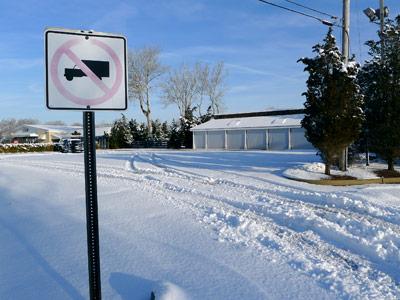Plans for an Amagansett 7-Eleven Moving Ahead

Transformation of the former Villa Principi restaurant building in Amagansett into a new 7-Eleven store is moving ahead after a building permit was issued last week for interior renovations there.
The site, a former restaurant that has been empty for years, is just east of the Amagansett I.G.A., and is owned by the Principi family. The building permit was issued to Richard Principi, Tom Preiato, East Hampton Town’s chief building inspector, said Monday.
The permit allows 2,412 square feet of interior alterations to create retail space for a “proposed convenience store.” Though 7-Eleven is not specified, the plans depict what appears to be a standard layout for a 7-Eleven store, and note that the light fixtures will be “furnished to contractor by 7-Eleven.”
“We are in final negotiations with corporate 7-Eleven,” Mr. Principi confirmed yesterday. “We worked real hard to get to this point,” he said.
The prospect of an Amagansett 7-Eleven first came to light three years ago this week and riled some residents of the hamlet, just as the opening of a 7-Eleven in Montauk — the first in East Hampton Town — had made waves the year before.
The town’s architectural review board approved minor exterior changes to the building, and a building permit was issued for a façade change and minor interior building changes last year, though Principi family members would not confirm or deny rumors of the coming 7-Eleven at the time.
Mr. Principi, a contractor who is doing the interior building work himself, said the store would be similar to the Montauk 7-Eleven. It will be run by a franchisee, who is unknown at this time.
Community members in the past have expressed concern over corporate competition with local businesses, the aesthetics of a chain store, and the extended hours of operation of 7-Eleven stores, some of which are open 24 hours a day.
The town does not have a prohibition against chain stores. Mr. Preiato said that before issuing the building permit last week, he had met with town attorneys to discuss whether the interior changes to the building could trigger a requirement for a site plan review.
The property is in a central business zone, he said, where both a restaurant and a retail store are allowed. A site plan review would be required, he said, when changing from one of those permitted uses to another, if the occupancy of the site was to increase under the new use.
“This does not increase; it decreases substantially,” he said.
The restaurant had a maximum occupancy of 116, he said, while the occupancy of a retail store would be set at 30 people, requiring 10 or 11 parking spaces, Mr. Preiato said.
“It really is a permitted use there,” the building inspector said of a new retail store — including a 7-Eleven. “We don’t have anti-franchise codes.”
